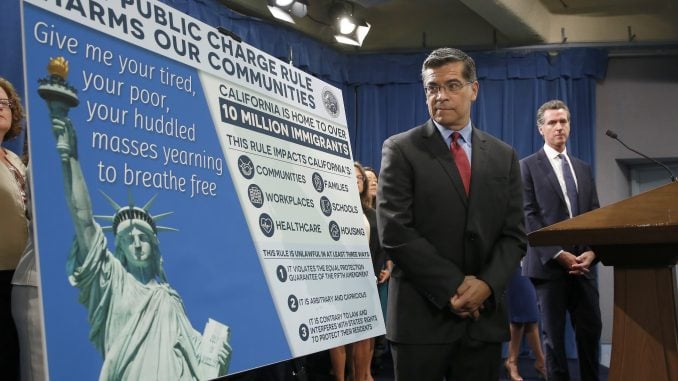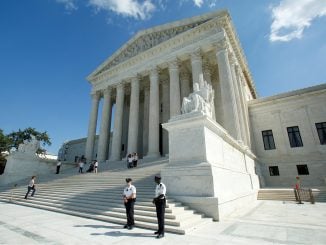
NEW YORK — The scene is playing out in courtrooms from coast to coast — federal judges being asked to block a new Trump administration policy scheduled to take effect next week that would deny permanent legal residency to immigrants who would be dependent on public benefits.
Almost a dozen lawsuits have been filed from New York to California with plaintiffs including states, counties, cities, service providers and immigrants to prevent the “public charge” rule from taking effect on Oct. 15. A judge in California held a hearing last week, while a judge in New York held one on Monday, and others are scheduled for this week, with the lawsuits asking for preliminary injunctions to keep the rule from being enforced while challenges to its legality are ongoing. Judges have indicated a willingness to issue rulings before the scheduled start date.
“I’ve litigated against federal and state agencies over the years and I’ve never seen anything like this,” said Liz Schott of the Center on Budget and Policy Priorities, which has been tracking the progress of the various lawsuits. “It’s a tremendously broad set of players reflecting the huge significance and impact of the rule.”
The new rule is part of an overhaul of the nation’s immigration system that the administration has been trying to put into place. While much of the attention has focused on President Donald Trump’s efforts to crack down on illegal immigration, the new change affect people who entered the United States legally and are seeking permanent status. It is part of an effort to move the U.S. to a system that focuses on immigrants’ skills instead of family contacts.
Currently, legal immigrants seeking to become permanent residents (a step before being eligible to become naturalized citizens) must prove they won’t be burdens to the country, or public charges, which in practice has been understood to mean becoming primarily dependent on cash assistance, income maintenance or government support for long-term institutionalization.
The Trump administration’s rule takes that further — considering past and current use of a wide range of assistance like Medicaid, food stamps, and housing vouchers that aren’t currently considered, taking into account factors like the immigrant’s age, employment status and English-language ability to determine whether they could potentially become public burdens at any point in the future and denying them legal residency if officials decide the answer is yes.
Those changes have outraged immigrants and their advocates, who say there’s already been a chilling effect from immigrants who are now scared to ask for help they’re eligible to get, for themselves or their relatives including citizen children, out of fear of what it could mean.
They’ve also said the rule changes are discriminatory and would have the effect of barring immigrants with lower incomes in favor of those with wealth. Acting director of Citizenship and Immigration Services, Ken Cuccinelli, said in August that the rule change fits with the Republican president’s message.
“We want to see people coming to this country who are self-sufficient,” Cuccinelli said. “That’s a core principle of the American dream. It’s deeply embedded in our history, and particularly our history related to legal immigration.”
The scheduled enactment next week of the rule comes as the Trump administration on Friday announced another rule, a proclamation effective Nov. 3 that bars immigrants from coming to the U.S. unless they will be covered by health insurance within 30 days of entering or have the financial wherewithal to pay for any medical costs.
In a packed Manhattan courtroom on Monday, U.S. District Judge George Daniels extensively questioned the government’s lawyer, Ethan Davis of the Department of Justice, over the rationale behind the administration’s changing of the rule and the adding of factors that would be considered in determining whether someone could become a public charge.
“You’ve got to give me some rational basis,” he said.
Roughly 544,000 people apply for green cards annually. According to the government, 382,000 are in categories that would make them subject to the new review.
North State Journal staff contributed to this report.



